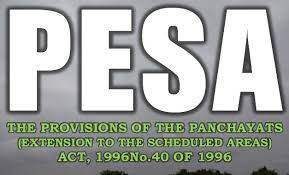PESA Act:

Hundreds of kendu leaf pluckers, binders and workers recently staged a demonstration in Sambalpur, Odisha demanding the abolition of GST on kendu leaves.
- A GST of 18 per cent is imposed on kendu leaves which is against the Forest Rights Act-2006 and the Panchayats (Extension to the Scheduled Areas) Act, 1996 (PESA) to celebrate 25th year of PESA Act.
- Besides, the government has imposed a GST of 28 per cent on bidi which is a finished product made of kendu leaf.
- This double taxation has hit the profits of kendu leaf organisation and affected the livelihood of around 12 lakh workers.
- While the profits have reduced drastically, they are now deprived of many social security benefits too.
About Kendu Leaves:
- Kendu leaf is called the green gold of Odisha. It is a nationalised product like bamboo and sal seed. It is one of the most important non-wood forest products in Odisha.
- The leaves are used to wrap bidis, a popular smoke among the locals.
- The Uniqueness of Odisha’s Tendu (kendu) leaf is in processed form whereas the rest of the states in India produce in Phal
- Traditional medical practitioners use these tiny fruits of Kendu to treat malaria, diarrhoea and dysentery.
- Kendu leaves are the major source for tribal villages, since it is the most prominent Minor Forest Produce of the state.
- Odisha is the third-largest producer of kendu leaf, after Madhya Pradesh and Chhattisgarh.
The Panchayats (Extension to Scheduled Areas) Act, 1996 or PESA Act is a law enacted by the Government of India for ensuring self-governance through traditional Gram Sabhas for people living in the Scheduled Areas of India.
- It was enacted by Parliament in 1996 and came into force on 24th December 1996.
- The PESA is considered to be the backbone of tribal legislation in India.
- PESA recognises the traditional system of the decision-making process and stands for the peoples’ self-governance.
- To promote local self-governance in rural India, the 73rd constitutional amendment was made in 1992. Through this amendment, a three-tier Panchayati Raj Institution was made into a law.
- However, its application to the scheduled and tribal areas under Article 243(M) was restricted.
- After the Bhuria Committee recommendations in 1995, Panchayat Extension to Scheduled Areas (PESA) Act 1996 came into existence for ensuring tribal self-rule for people living in scheduled areas of India.
- The PESA conferred the absolute powers to Gram Sabha, whereas state legislature has given an advisory role to ensure the proper functioning of Panchayats and Gram Sabhas.
- The power delegated to Gram Sabha cannot be curtailed by a higher level, and there shall be independence throughout.




